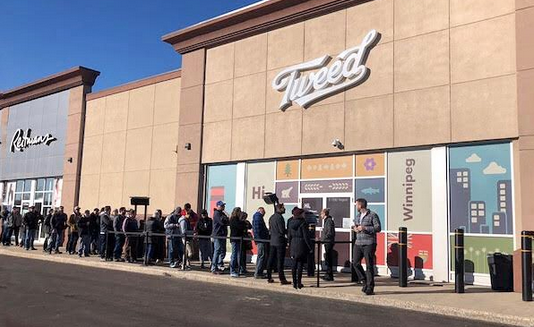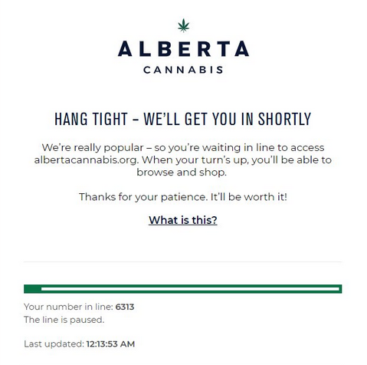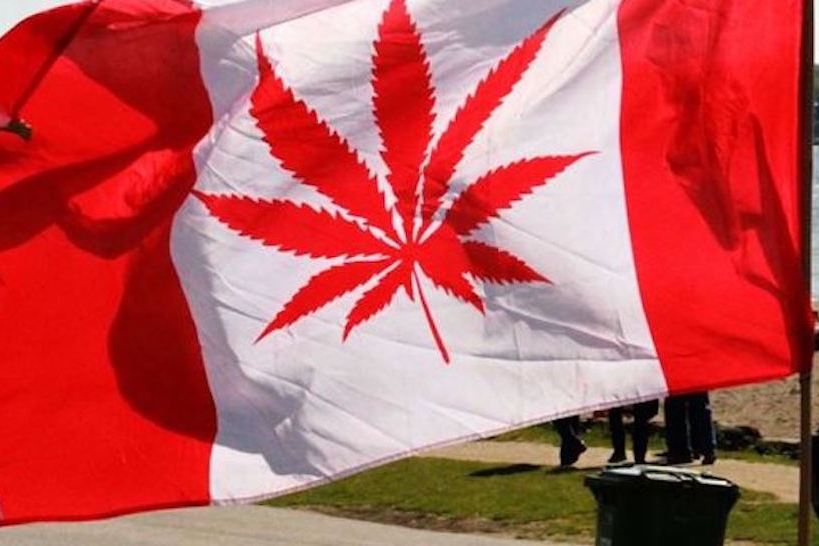Cannabis stores in Canada ran out of stock after the first day of legalisation, underlying the popularity of the move and the challenges ahead for the industry to match supply to demand.
One store owner claimed they had, of all the times, somehow ran out of weed at 4:20. In Quebec, customers waited for hours in lines but many were sent home without being served; even if they did get in, they found a limited supply, leaving some to comment that the black market was back in business. But the queues returned the following day. There have also problems with online sales and a postal strike has also played a part in delays.
Shortages were forecast. In a study released earlier this month, researchers at the University of Waterloo and the C.D. Howe Institute found that while Canada could supply around 210 tons of cannabis in the first year, demand would be around 610. Clearly, the industry is going to have to grow – a nice problem to have.

Meanwhile, the government has promised to pardon Canadians who have been convicted of the simple possession of cannabis – but they will have to wait until next year as the federal legislation to create a new amnesty process is not yet ready.
Public Safety Minister Ralph Goodale said the Government aims introduce the legislation before the end of the year. He said the application to obtain a pardon will be free of charge, adding that applicants will not have to wait for a set period of time after they have finished serving their sentence. However, he said the government will not pro-actively expunge all conviction records for the possession of less than 30 grams of cannabis, as it did in the case of men who were convicted of engaging in homosexual acts before 1969.
“We have utilised the tool of expungement in cases where there is a profound historical injustice that needed to be corrected,” Goodale said. “The laws with respect to cannabis that have existed historically, we believe, are out of step with current mores and views in Canada, but are not of the same nature as the historic, social injustice that was imposed in relation to the LGBTQ2 community.”
Canada has become the world’s second – after Uruguay in 2013 – and largest country with a legal national marijuana marketplace.
Medical marijuana has been legal in Canada since 2001 but that has now been expanded to recreational marijuana after two years of work by Justin Trudeau’s government, designed to undermine the black market, promote business and bring in new tax revenues, while also reflecting increasingly liberal views towards cannabis.
Legalisation began at midnight on 17 October with shops in Canada’s eastern-most provinces the first to sell the drug.
Tom Clarke, 43, said he was “living my dream” as a store owner in Newfoundland, having dealt marijuana illegally in Canada for 30 years.

Many websites had to apologise for delays caused by shortages
At least 111 legal pot shops opened across the country of 37 million people on the first day. Canadians everywhere can now order marijuana products through websites run by provinces or private retailers and have it delivered to their homes by mail. Illegal dispensaries will struggle to survive the transition to licensed retailing over the next three months.
No stores have opened in Ontario, which includes Toronto. The most populous province is working on its regulations and does not expect any stores to open until next spring.
Trudeau has warned the incoming Quebec government’s plan to raise the legal age for smoking cannabis to 21, instead of the national policy of 18, could leave a gap in the market for organised crime.
Strict guidelines from Health Canada stipulate that packaging has to list all the information a consumer needs to make an informed decision, including the name of the producer, the name of the marijuana strain, and its THC/CBD content, plus a large disclaimer about potential health risks.
Adults are allowed to carry up to 30g of dried cannabis (or its equivalent) in a “public space”, including personal vehicles, making that the maximum you can buy at anyone time. Up to five years in jail is the sentence for being caught out in public with more than 30g.

Tweed’s first customer received their legal weed at midnight
Marijuana can be consumed recreationally in edible form or any other manner, so long as it is you kept away from children. New Brunswick will also require weed to be stored in a locked room or container, not unlike a firearm. However, pre-made edibles and other marijuana extracts won’t be available to buy until sometime in 2019.
People will be allowed to share cannabis with neighbours and friends but they will not be allowed to sell it to them. Anyone found selling marijuana without a license will face fines up to $5,000 or up to 14 years in prison. Driving high remains illegal.
Federal guidelines allow recreational users to grow up to four plants per household, up to a metre tall. Most provinces have acceded to this suggestion, with some (like British Columbia) stipulating that the plants must be grown in a secure location out of public view. In Manitoba and Quebec, however, home growing remains illegal. Landlords in some provinces are also pushing for the right to ban tenants from growing cannabis in their rental properties. Growers have been told not to move their plants while they’re budding or flowering; appearing in a public space with a blooming cannabis plant can result in a $5,000 fine, or five years in prison.
Canada is not expected to liberalise anymore drug laws. The Young Liberals passed a resolution calling for decriminalising drug use at the Liberals’ 2018 policy convention, but Trudeau has said that his government is done with rescheduling controlled substances.




